An In-Depth Project Risk Management Analysis of the BBC DMI Initiative
VerifiedAdded on 2023/01/17
|11
|2319
|85
Report
AI Summary
This report provides a detailed risk management analysis of the BBC's Digital Media Initiative (DMI) project failure. It begins with an abstract and introduction outlining the project's goals, which included modernizing the production process through digitalization. The report then delves into a retrospective research section, examining the project's history, the outsourcing to Siemens, and the subsequent cost overruns and technical issues that led to its cancellation. The aims and goals of the DMI implementation are evaluated, along with the factors that led to the failure of the implementation. The risk management methodology adopted, based on the PMBOK process, is described, including risk planning, identification, analysis, evaluation, execution, and monitoring. The report identifies both internal and external risks associated with the project, such as over-budgeting, inefficient leadership, and non-compliance with regulations. A risk assessment is conducted, identifying key stakeholders and potential risk factors. The report concludes by highlighting the major causes of the project's failure and suggesting improved monitoring and evaluation techniques.
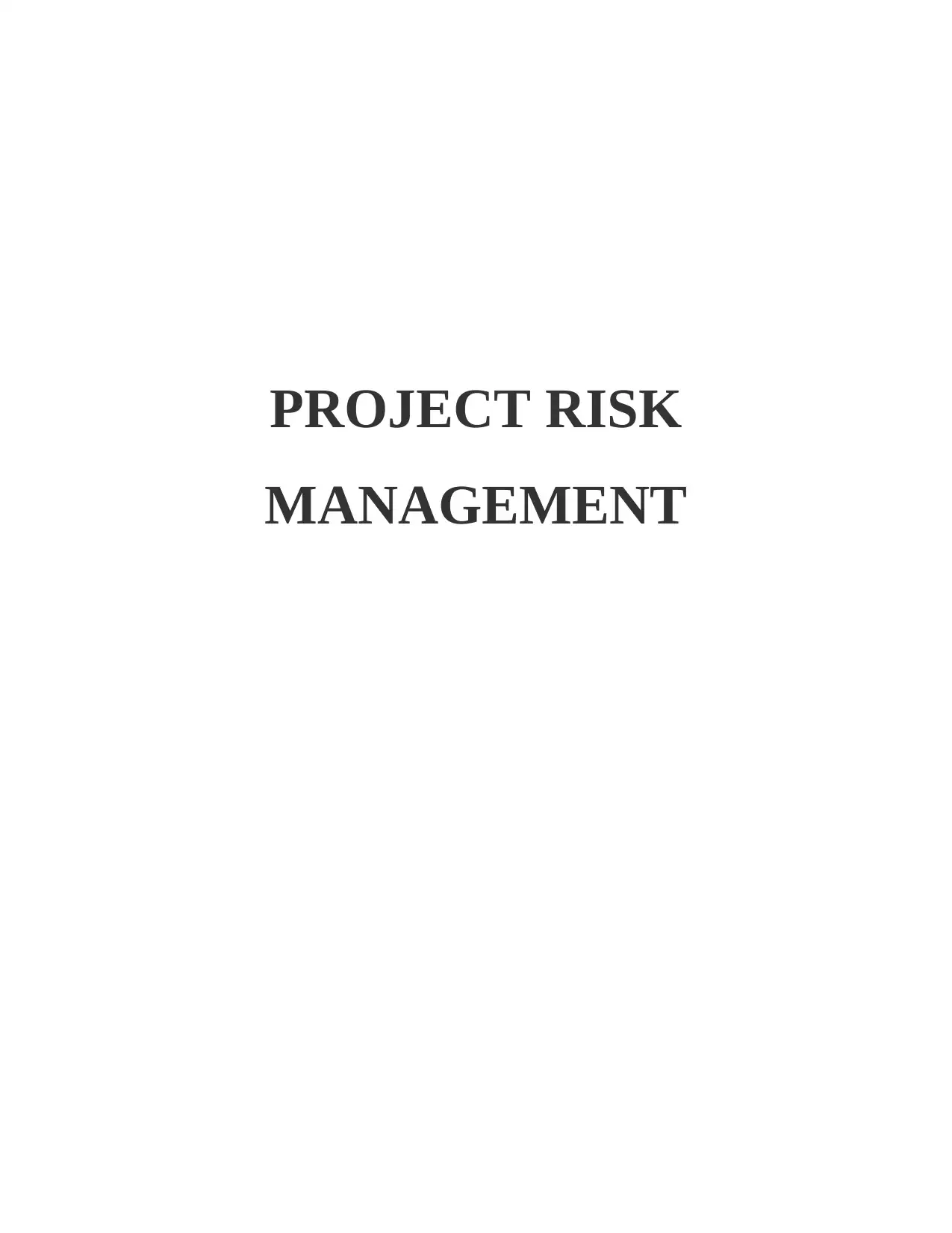
PROJECT RISK
MANAGEMENT
MANAGEMENT
Paraphrase This Document
Need a fresh take? Get an instant paraphrase of this document with our AI Paraphraser
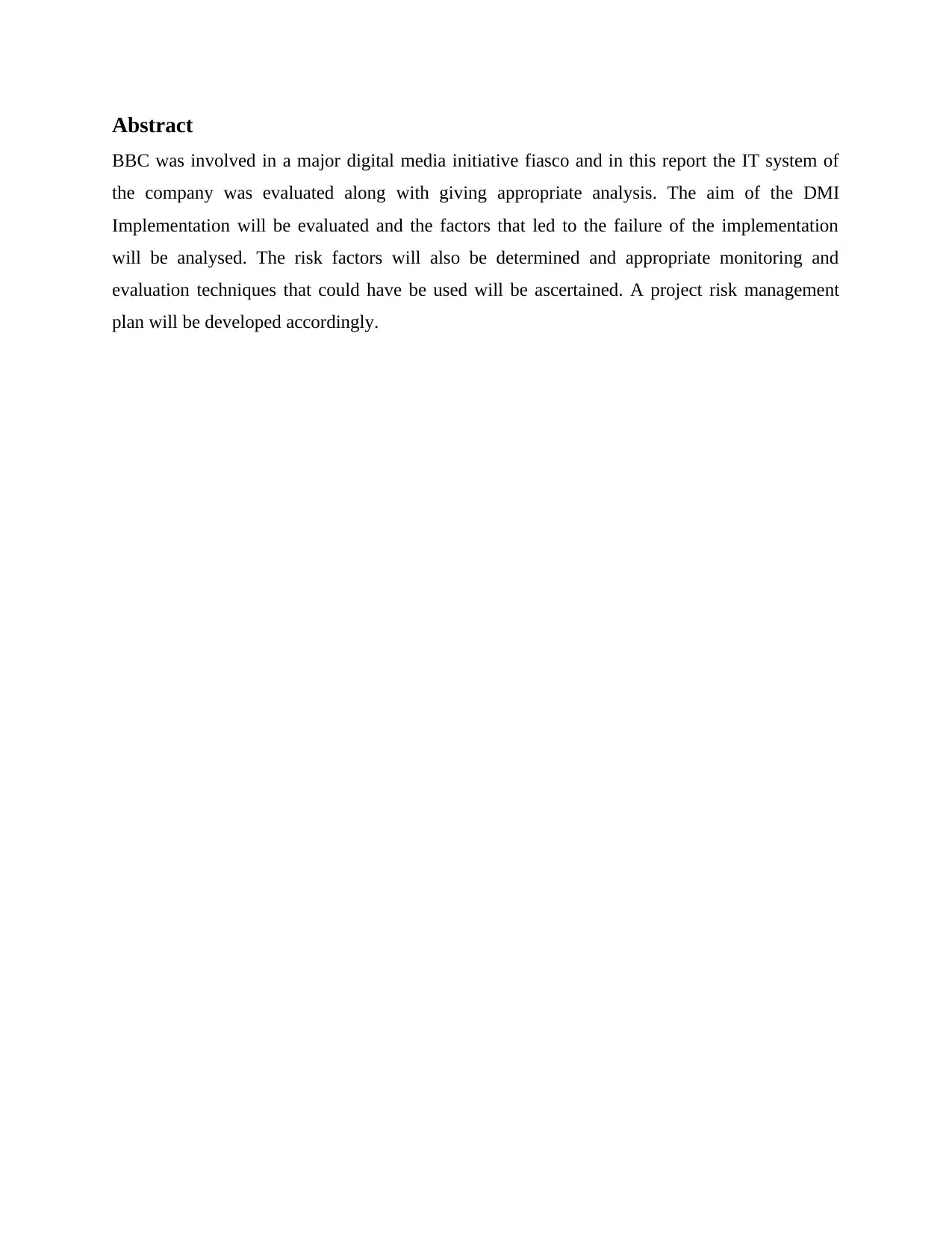
Abstract
BBC was involved in a major digital media initiative fiasco and in this report the IT system of
the company was evaluated along with giving appropriate analysis. The aim of the DMI
Implementation will be evaluated and the factors that led to the failure of the implementation
will be analysed. The risk factors will also be determined and appropriate monitoring and
evaluation techniques that could have be used will be ascertained. A project risk management
plan will be developed accordingly.
BBC was involved in a major digital media initiative fiasco and in this report the IT system of
the company was evaluated along with giving appropriate analysis. The aim of the DMI
Implementation will be evaluated and the factors that led to the failure of the implementation
will be analysed. The risk factors will also be determined and appropriate monitoring and
evaluation techniques that could have be used will be ascertained. A project risk management
plan will be developed accordingly.
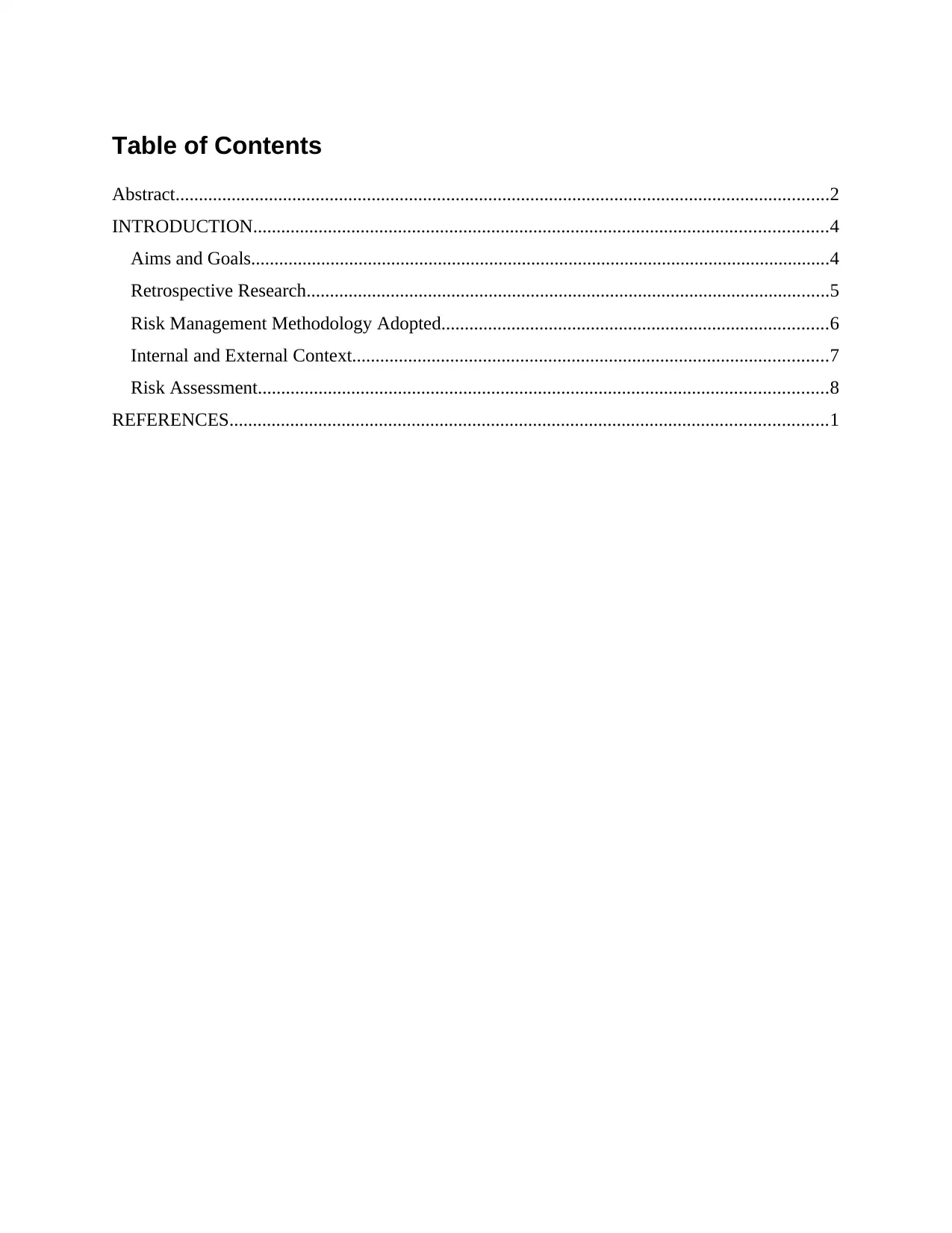
Table of Contents
Abstract............................................................................................................................................2
INTRODUCTION...........................................................................................................................4
Aims and Goals............................................................................................................................4
Retrospective Research................................................................................................................5
Risk Management Methodology Adopted...................................................................................6
Internal and External Context......................................................................................................7
Risk Assessment..........................................................................................................................8
REFERENCES................................................................................................................................1
Abstract............................................................................................................................................2
INTRODUCTION...........................................................................................................................4
Aims and Goals............................................................................................................................4
Retrospective Research................................................................................................................5
Risk Management Methodology Adopted...................................................................................6
Internal and External Context......................................................................................................7
Risk Assessment..........................................................................................................................8
REFERENCES................................................................................................................................1
⊘ This is a preview!⊘
Do you want full access?
Subscribe today to unlock all pages.

Trusted by 1+ million students worldwide
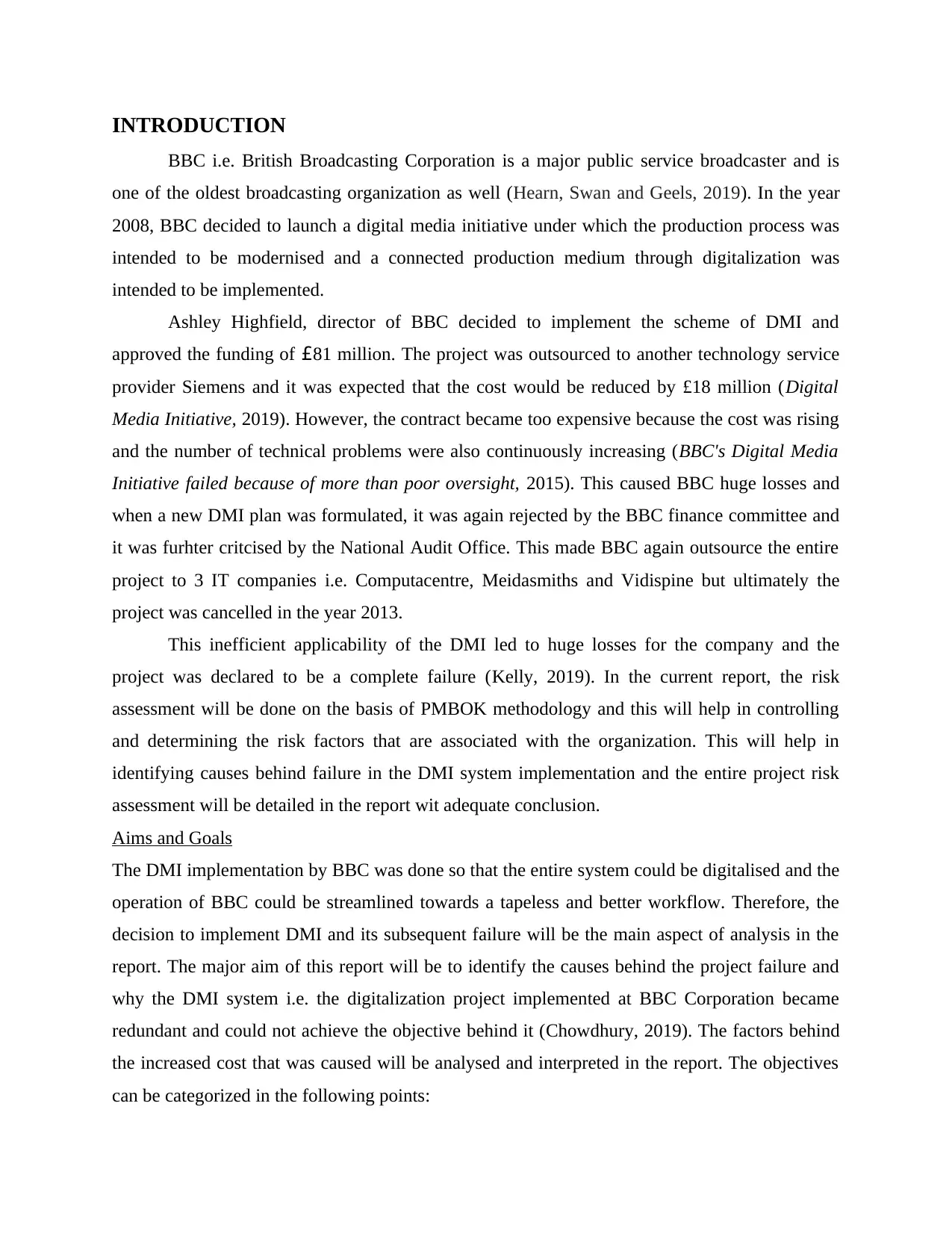
INTRODUCTION
BBC i.e. British Broadcasting Corporation is a major public service broadcaster and is
one of the oldest broadcasting organization as well (Hearn, Swan and Geels, 2019). In the year
2008, BBC decided to launch a digital media initiative under which the production process was
intended to be modernised and a connected production medium through digitalization was
intended to be implemented.
Ashley Highfield, director of BBC decided to implement the scheme of DMI and
approved the funding of £81 million. The project was outsourced to another technology service
provider Siemens and it was expected that the cost would be reduced by £18 million (Digital
Media Initiative, 2019). However, the contract became too expensive because the cost was rising
and the number of technical problems were also continuously increasing (BBC's Digital Media
Initiative failed because of more than poor oversight, 2015). This caused BBC huge losses and
when a new DMI plan was formulated, it was again rejected by the BBC finance committee and
it was furhter critcised by the National Audit Office. This made BBC again outsource the entire
project to 3 IT companies i.e. Computacentre, Meidasmiths and Vidispine but ultimately the
project was cancelled in the year 2013.
This inefficient applicability of the DMI led to huge losses for the company and the
project was declared to be a complete failure (Kelly, 2019). In the current report, the risk
assessment will be done on the basis of PMBOK methodology and this will help in controlling
and determining the risk factors that are associated with the organization. This will help in
identifying causes behind failure in the DMI system implementation and the entire project risk
assessment will be detailed in the report wit adequate conclusion.
Aims and Goals
The DMI implementation by BBC was done so that the entire system could be digitalised and the
operation of BBC could be streamlined towards a tapeless and better workflow. Therefore, the
decision to implement DMI and its subsequent failure will be the main aspect of analysis in the
report. The major aim of this report will be to identify the causes behind the project failure and
why the DMI system i.e. the digitalization project implemented at BBC Corporation became
redundant and could not achieve the objective behind it (Chowdhury, 2019). The factors behind
the increased cost that was caused will be analysed and interpreted in the report. The objectives
can be categorized in the following points:
BBC i.e. British Broadcasting Corporation is a major public service broadcaster and is
one of the oldest broadcasting organization as well (Hearn, Swan and Geels, 2019). In the year
2008, BBC decided to launch a digital media initiative under which the production process was
intended to be modernised and a connected production medium through digitalization was
intended to be implemented.
Ashley Highfield, director of BBC decided to implement the scheme of DMI and
approved the funding of £81 million. The project was outsourced to another technology service
provider Siemens and it was expected that the cost would be reduced by £18 million (Digital
Media Initiative, 2019). However, the contract became too expensive because the cost was rising
and the number of technical problems were also continuously increasing (BBC's Digital Media
Initiative failed because of more than poor oversight, 2015). This caused BBC huge losses and
when a new DMI plan was formulated, it was again rejected by the BBC finance committee and
it was furhter critcised by the National Audit Office. This made BBC again outsource the entire
project to 3 IT companies i.e. Computacentre, Meidasmiths and Vidispine but ultimately the
project was cancelled in the year 2013.
This inefficient applicability of the DMI led to huge losses for the company and the
project was declared to be a complete failure (Kelly, 2019). In the current report, the risk
assessment will be done on the basis of PMBOK methodology and this will help in controlling
and determining the risk factors that are associated with the organization. This will help in
identifying causes behind failure in the DMI system implementation and the entire project risk
assessment will be detailed in the report wit adequate conclusion.
Aims and Goals
The DMI implementation by BBC was done so that the entire system could be digitalised and the
operation of BBC could be streamlined towards a tapeless and better workflow. Therefore, the
decision to implement DMI and its subsequent failure will be the main aspect of analysis in the
report. The major aim of this report will be to identify the causes behind the project failure and
why the DMI system i.e. the digitalization project implemented at BBC Corporation became
redundant and could not achieve the objective behind it (Chowdhury, 2019). The factors behind
the increased cost that was caused will be analysed and interpreted in the report. The objectives
can be categorized in the following points:
Paraphrase This Document
Need a fresh take? Get an instant paraphrase of this document with our AI Paraphraser
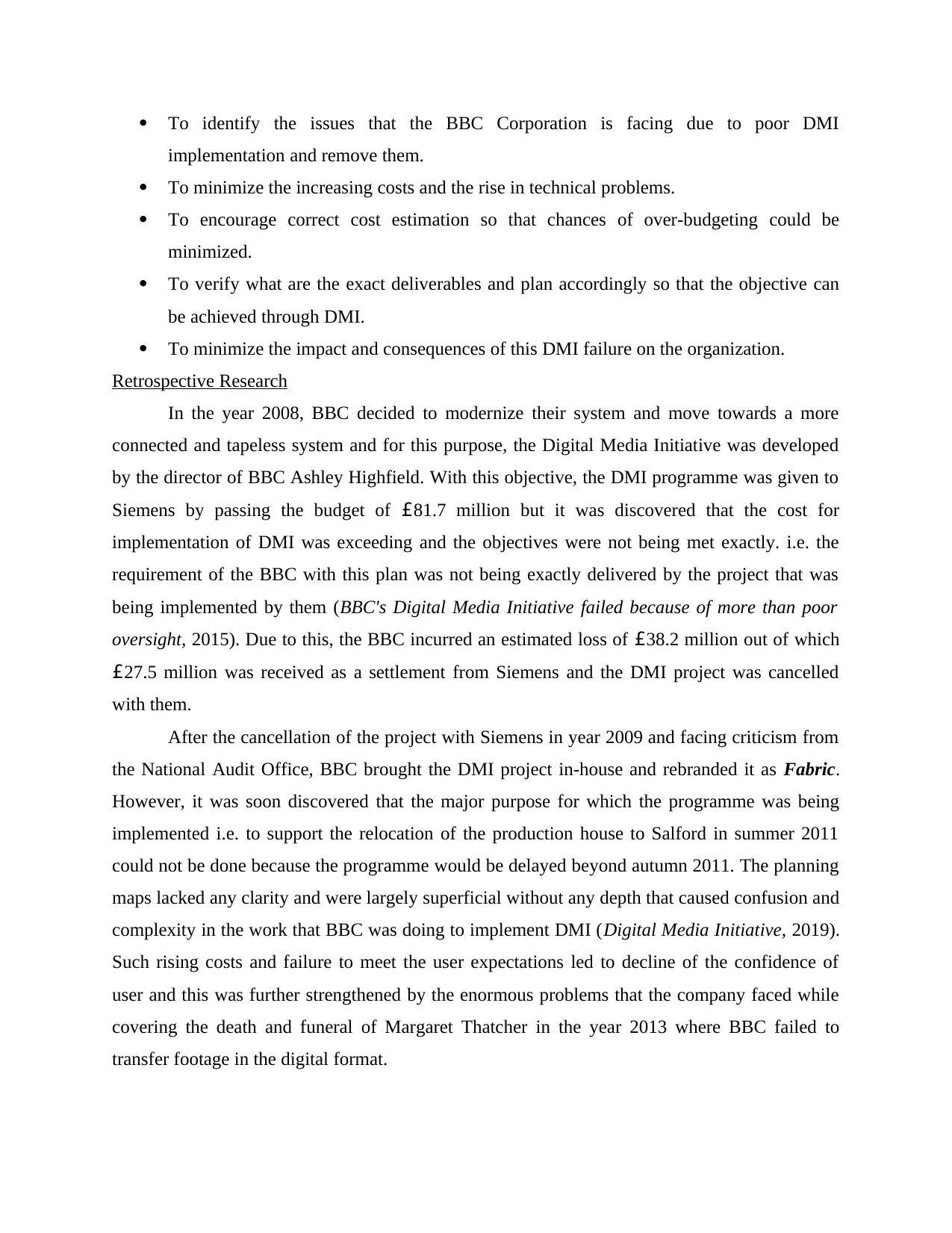
To identify the issues that the BBC Corporation is facing due to poor DMI
implementation and remove them.
To minimize the increasing costs and the rise in technical problems.
To encourage correct cost estimation so that chances of over-budgeting could be
minimized.
To verify what are the exact deliverables and plan accordingly so that the objective can
be achieved through DMI.
To minimize the impact and consequences of this DMI failure on the organization.
Retrospective Research
In the year 2008, BBC decided to modernize their system and move towards a more
connected and tapeless system and for this purpose, the Digital Media Initiative was developed
by the director of BBC Ashley Highfield. With this objective, the DMI programme was given to
Siemens by passing the budget of £81.7 million but it was discovered that the cost for
implementation of DMI was exceeding and the objectives were not being met exactly. i.e. the
requirement of the BBC with this plan was not being exactly delivered by the project that was
being implemented by them (BBC's Digital Media Initiative failed because of more than poor
oversight, 2015). Due to this, the BBC incurred an estimated loss of £38.2 million out of which
£27.5 million was received as a settlement from Siemens and the DMI project was cancelled
with them.
After the cancellation of the project with Siemens in year 2009 and facing criticism from
the National Audit Office, BBC brought the DMI project in-house and rebranded it as Fabric.
However, it was soon discovered that the major purpose for which the programme was being
implemented i.e. to support the relocation of the production house to Salford in summer 2011
could not be done because the programme would be delayed beyond autumn 2011. The planning
maps lacked any clarity and were largely superficial without any depth that caused confusion and
complexity in the work that BBC was doing to implement DMI (Digital Media Initiative, 2019).
Such rising costs and failure to meet the user expectations led to decline of the confidence of
user and this was further strengthened by the enormous problems that the company faced while
covering the death and funeral of Margaret Thatcher in the year 2013 where BBC failed to
transfer footage in the digital format.
implementation and remove them.
To minimize the increasing costs and the rise in technical problems.
To encourage correct cost estimation so that chances of over-budgeting could be
minimized.
To verify what are the exact deliverables and plan accordingly so that the objective can
be achieved through DMI.
To minimize the impact and consequences of this DMI failure on the organization.
Retrospective Research
In the year 2008, BBC decided to modernize their system and move towards a more
connected and tapeless system and for this purpose, the Digital Media Initiative was developed
by the director of BBC Ashley Highfield. With this objective, the DMI programme was given to
Siemens by passing the budget of £81.7 million but it was discovered that the cost for
implementation of DMI was exceeding and the objectives were not being met exactly. i.e. the
requirement of the BBC with this plan was not being exactly delivered by the project that was
being implemented by them (BBC's Digital Media Initiative failed because of more than poor
oversight, 2015). Due to this, the BBC incurred an estimated loss of £38.2 million out of which
£27.5 million was received as a settlement from Siemens and the DMI project was cancelled
with them.
After the cancellation of the project with Siemens in year 2009 and facing criticism from
the National Audit Office, BBC brought the DMI project in-house and rebranded it as Fabric.
However, it was soon discovered that the major purpose for which the programme was being
implemented i.e. to support the relocation of the production house to Salford in summer 2011
could not be done because the programme would be delayed beyond autumn 2011. The planning
maps lacked any clarity and were largely superficial without any depth that caused confusion and
complexity in the work that BBC was doing to implement DMI (Digital Media Initiative, 2019).
Such rising costs and failure to meet the user expectations led to decline of the confidence of
user and this was further strengthened by the enormous problems that the company faced while
covering the death and funeral of Margaret Thatcher in the year 2013 where BBC failed to
transfer footage in the digital format.
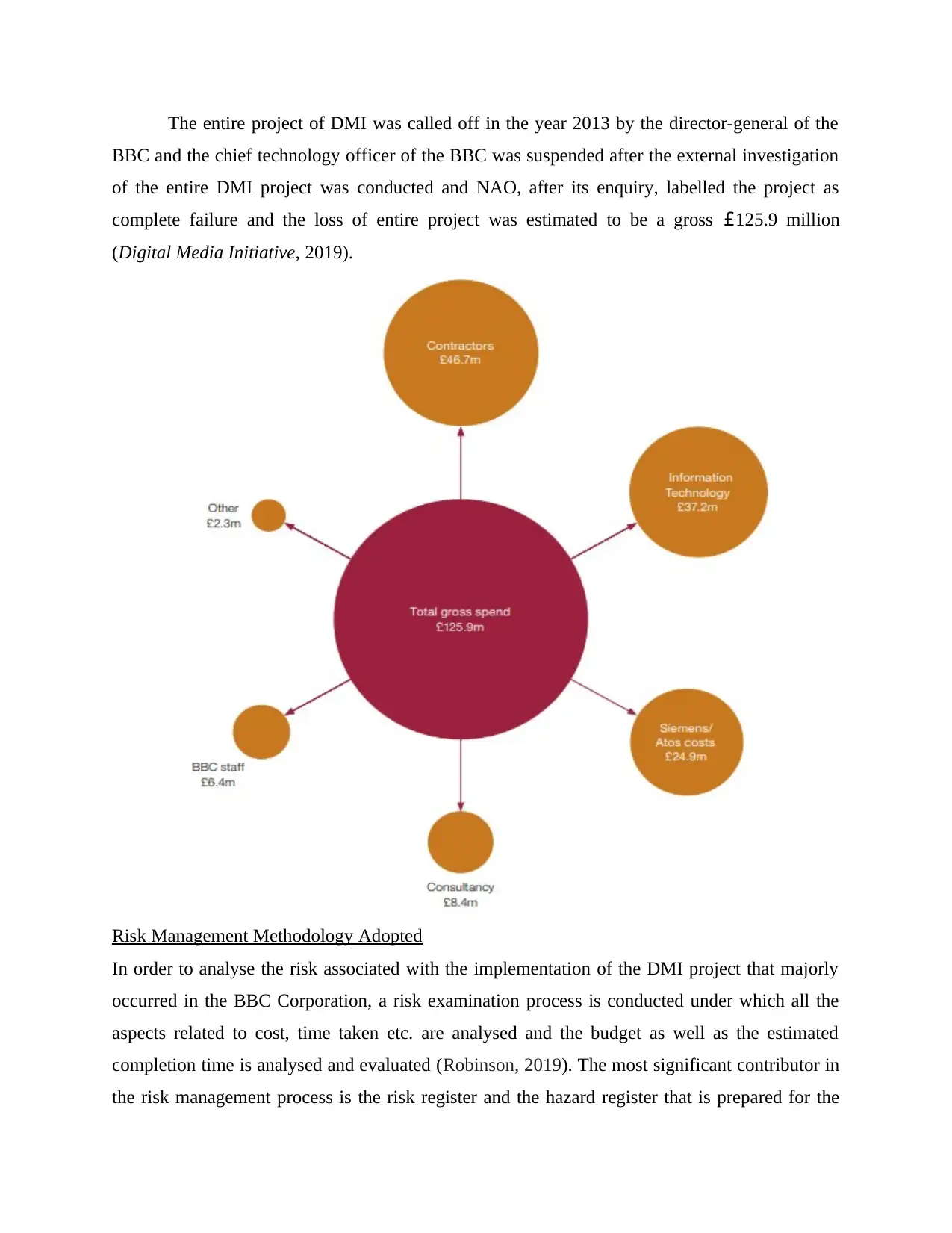
The entire project of DMI was called off in the year 2013 by the director-general of the
BBC and the chief technology officer of the BBC was suspended after the external investigation
of the entire DMI project was conducted and NAO, after its enquiry, labelled the project as
complete failure and the loss of entire project was estimated to be a gross £125.9 million
(Digital Media Initiative, 2019).
Risk Management Methodology Adopted
In order to analyse the risk associated with the implementation of the DMI project that majorly
occurred in the BBC Corporation, a risk examination process is conducted under which all the
aspects related to cost, time taken etc. are analysed and the budget as well as the estimated
completion time is analysed and evaluated (Robinson, 2019). The most significant contributor in
the risk management process is the risk register and the hazard register that is prepared for the
BBC and the chief technology officer of the BBC was suspended after the external investigation
of the entire DMI project was conducted and NAO, after its enquiry, labelled the project as
complete failure and the loss of entire project was estimated to be a gross £125.9 million
(Digital Media Initiative, 2019).
Risk Management Methodology Adopted
In order to analyse the risk associated with the implementation of the DMI project that majorly
occurred in the BBC Corporation, a risk examination process is conducted under which all the
aspects related to cost, time taken etc. are analysed and the budget as well as the estimated
completion time is analysed and evaluated (Robinson, 2019). The most significant contributor in
the risk management process is the risk register and the hazard register that is prepared for the
⊘ This is a preview!⊘
Do you want full access?
Subscribe today to unlock all pages.

Trusted by 1+ million students worldwide
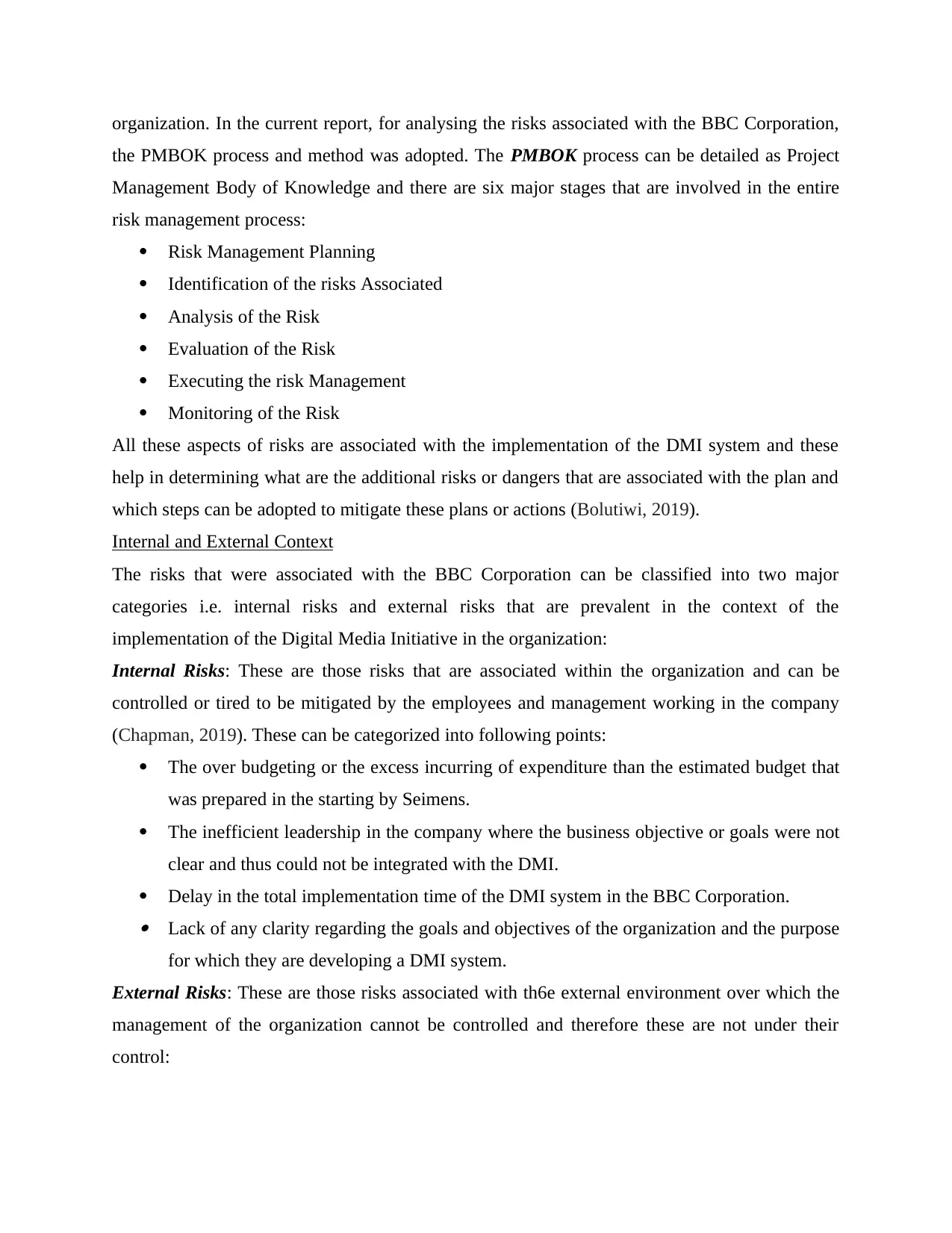
organization. In the current report, for analysing the risks associated with the BBC Corporation,
the PMBOK process and method was adopted. The PMBOK process can be detailed as Project
Management Body of Knowledge and there are six major stages that are involved in the entire
risk management process:
Risk Management Planning
Identification of the risks Associated
Analysis of the Risk
Evaluation of the Risk
Executing the risk Management
Monitoring of the Risk
All these aspects of risks are associated with the implementation of the DMI system and these
help in determining what are the additional risks or dangers that are associated with the plan and
which steps can be adopted to mitigate these plans or actions (Bolutiwi, 2019).
Internal and External Context
The risks that were associated with the BBC Corporation can be classified into two major
categories i.e. internal risks and external risks that are prevalent in the context of the
implementation of the Digital Media Initiative in the organization:
Internal Risks: These are those risks that are associated within the organization and can be
controlled or tired to be mitigated by the employees and management working in the company
(Chapman, 2019). These can be categorized into following points:
The over budgeting or the excess incurring of expenditure than the estimated budget that
was prepared in the starting by Seimens.
The inefficient leadership in the company where the business objective or goals were not
clear and thus could not be integrated with the DMI.
Delay in the total implementation time of the DMI system in the BBC Corporation. Lack of any clarity regarding the goals and objectives of the organization and the purpose
for which they are developing a DMI system.
External Risks: These are those risks associated with th6e external environment over which the
management of the organization cannot be controlled and therefore these are not under their
control:
the PMBOK process and method was adopted. The PMBOK process can be detailed as Project
Management Body of Knowledge and there are six major stages that are involved in the entire
risk management process:
Risk Management Planning
Identification of the risks Associated
Analysis of the Risk
Evaluation of the Risk
Executing the risk Management
Monitoring of the Risk
All these aspects of risks are associated with the implementation of the DMI system and these
help in determining what are the additional risks or dangers that are associated with the plan and
which steps can be adopted to mitigate these plans or actions (Bolutiwi, 2019).
Internal and External Context
The risks that were associated with the BBC Corporation can be classified into two major
categories i.e. internal risks and external risks that are prevalent in the context of the
implementation of the Digital Media Initiative in the organization:
Internal Risks: These are those risks that are associated within the organization and can be
controlled or tired to be mitigated by the employees and management working in the company
(Chapman, 2019). These can be categorized into following points:
The over budgeting or the excess incurring of expenditure than the estimated budget that
was prepared in the starting by Seimens.
The inefficient leadership in the company where the business objective or goals were not
clear and thus could not be integrated with the DMI.
Delay in the total implementation time of the DMI system in the BBC Corporation. Lack of any clarity regarding the goals and objectives of the organization and the purpose
for which they are developing a DMI system.
External Risks: These are those risks associated with th6e external environment over which the
management of the organization cannot be controlled and therefore these are not under their
control:
Paraphrase This Document
Need a fresh take? Get an instant paraphrase of this document with our AI Paraphraser
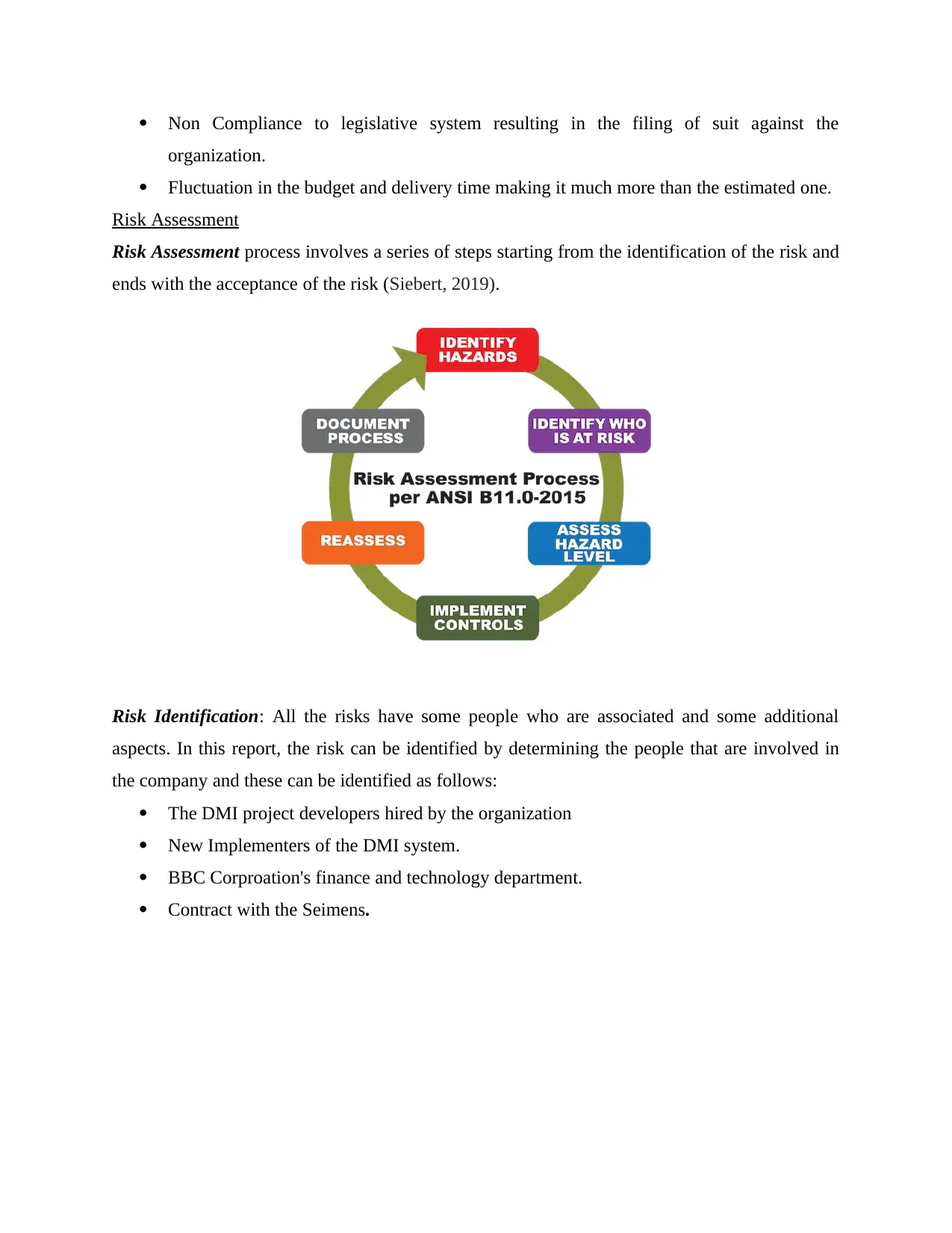
Non Compliance to legislative system resulting in the filing of suit against the
organization.
Fluctuation in the budget and delivery time making it much more than the estimated one.
Risk Assessment
Risk Assessment process involves a series of steps starting from the identification of the risk and
ends with the acceptance of the risk (Siebert, 2019).
Risk Identification: All the risks have some people who are associated and some additional
aspects. In this report, the risk can be identified by determining the people that are involved in
the company and these can be identified as follows:
The DMI project developers hired by the organization
New Implementers of the DMI system.
BBC Corproation's finance and technology department.
Contract with the Seimens.
organization.
Fluctuation in the budget and delivery time making it much more than the estimated one.
Risk Assessment
Risk Assessment process involves a series of steps starting from the identification of the risk and
ends with the acceptance of the risk (Siebert, 2019).
Risk Identification: All the risks have some people who are associated and some additional
aspects. In this report, the risk can be identified by determining the people that are involved in
the company and these can be identified as follows:
The DMI project developers hired by the organization
New Implementers of the DMI system.
BBC Corproation's finance and technology department.
Contract with the Seimens.
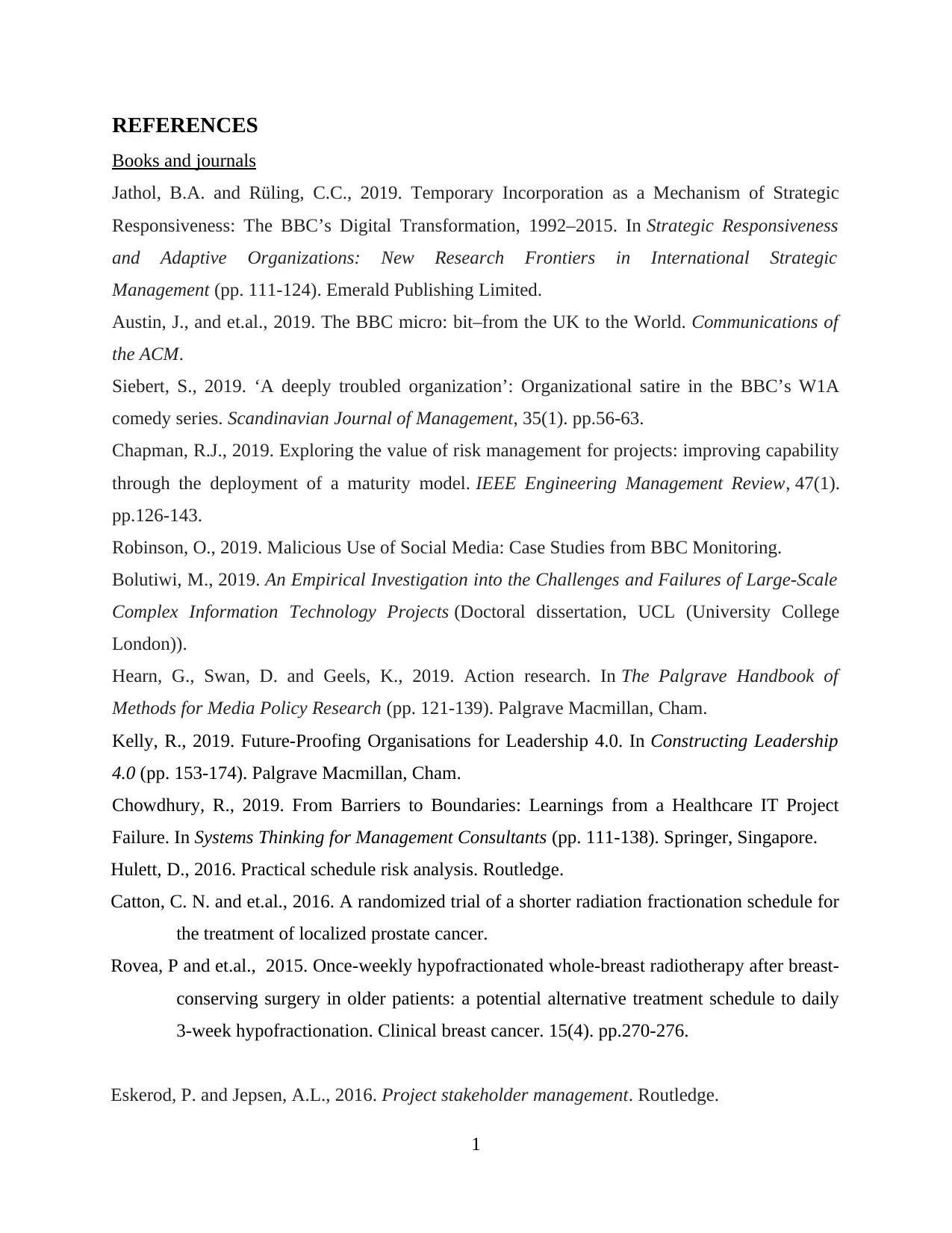
REFERENCES
Books and journals
Jathol, B.A. and Rüling, C.C., 2019. Temporary Incorporation as a Mechanism of Strategic
Responsiveness: The BBC’s Digital Transformation, 1992–2015. In Strategic Responsiveness
and Adaptive Organizations: New Research Frontiers in International Strategic
Management (pp. 111-124). Emerald Publishing Limited.
Austin, J., and et.al., 2019. The BBC micro: bit–from the UK to the World. Communications of
the ACM.
Siebert, S., 2019. ‘A deeply troubled organization’: Organizational satire in the BBC’s W1A
comedy series. Scandinavian Journal of Management, 35(1). pp.56-63.
Chapman, R.J., 2019. Exploring the value of risk management for projects: improving capability
through the deployment of a maturity model. IEEE Engineering Management Review, 47(1).
pp.126-143.
Robinson, O., 2019. Malicious Use of Social Media: Case Studies from BBC Monitoring.
Bolutiwi, M., 2019. An Empirical Investigation into the Challenges and Failures of Large-Scale
Complex Information Technology Projects (Doctoral dissertation, UCL (University College
London)).
Hearn, G., Swan, D. and Geels, K., 2019. Action research. In The Palgrave Handbook of
Methods for Media Policy Research (pp. 121-139). Palgrave Macmillan, Cham.
Kelly, R., 2019. Future-Proofing Organisations for Leadership 4.0. In Constructing Leadership
4.0 (pp. 153-174). Palgrave Macmillan, Cham.
Chowdhury, R., 2019. From Barriers to Boundaries: Learnings from a Healthcare IT Project
Failure. In Systems Thinking for Management Consultants (pp. 111-138). Springer, Singapore.
Hulett, D., 2016. Practical schedule risk analysis. Routledge.
Catton, C. N. and et.al., 2016. A randomized trial of a shorter radiation fractionation schedule for
the treatment of localized prostate cancer.
Rovea, P and et.al., 2015. Once-weekly hypofractionated whole-breast radiotherapy after breast-
conserving surgery in older patients: a potential alternative treatment schedule to daily
3-week hypofractionation. Clinical breast cancer. 15(4). pp.270-276.
Eskerod, P. and Jepsen, A.L., 2016. Project stakeholder management. Routledge.
1
Books and journals
Jathol, B.A. and Rüling, C.C., 2019. Temporary Incorporation as a Mechanism of Strategic
Responsiveness: The BBC’s Digital Transformation, 1992–2015. In Strategic Responsiveness
and Adaptive Organizations: New Research Frontiers in International Strategic
Management (pp. 111-124). Emerald Publishing Limited.
Austin, J., and et.al., 2019. The BBC micro: bit–from the UK to the World. Communications of
the ACM.
Siebert, S., 2019. ‘A deeply troubled organization’: Organizational satire in the BBC’s W1A
comedy series. Scandinavian Journal of Management, 35(1). pp.56-63.
Chapman, R.J., 2019. Exploring the value of risk management for projects: improving capability
through the deployment of a maturity model. IEEE Engineering Management Review, 47(1).
pp.126-143.
Robinson, O., 2019. Malicious Use of Social Media: Case Studies from BBC Monitoring.
Bolutiwi, M., 2019. An Empirical Investigation into the Challenges and Failures of Large-Scale
Complex Information Technology Projects (Doctoral dissertation, UCL (University College
London)).
Hearn, G., Swan, D. and Geels, K., 2019. Action research. In The Palgrave Handbook of
Methods for Media Policy Research (pp. 121-139). Palgrave Macmillan, Cham.
Kelly, R., 2019. Future-Proofing Organisations for Leadership 4.0. In Constructing Leadership
4.0 (pp. 153-174). Palgrave Macmillan, Cham.
Chowdhury, R., 2019. From Barriers to Boundaries: Learnings from a Healthcare IT Project
Failure. In Systems Thinking for Management Consultants (pp. 111-138). Springer, Singapore.
Hulett, D., 2016. Practical schedule risk analysis. Routledge.
Catton, C. N. and et.al., 2016. A randomized trial of a shorter radiation fractionation schedule for
the treatment of localized prostate cancer.
Rovea, P and et.al., 2015. Once-weekly hypofractionated whole-breast radiotherapy after breast-
conserving surgery in older patients: a potential alternative treatment schedule to daily
3-week hypofractionation. Clinical breast cancer. 15(4). pp.270-276.
Eskerod, P. and Jepsen, A.L., 2016. Project stakeholder management. Routledge.
1
⊘ This is a preview!⊘
Do you want full access?
Subscribe today to unlock all pages.

Trusted by 1+ million students worldwide
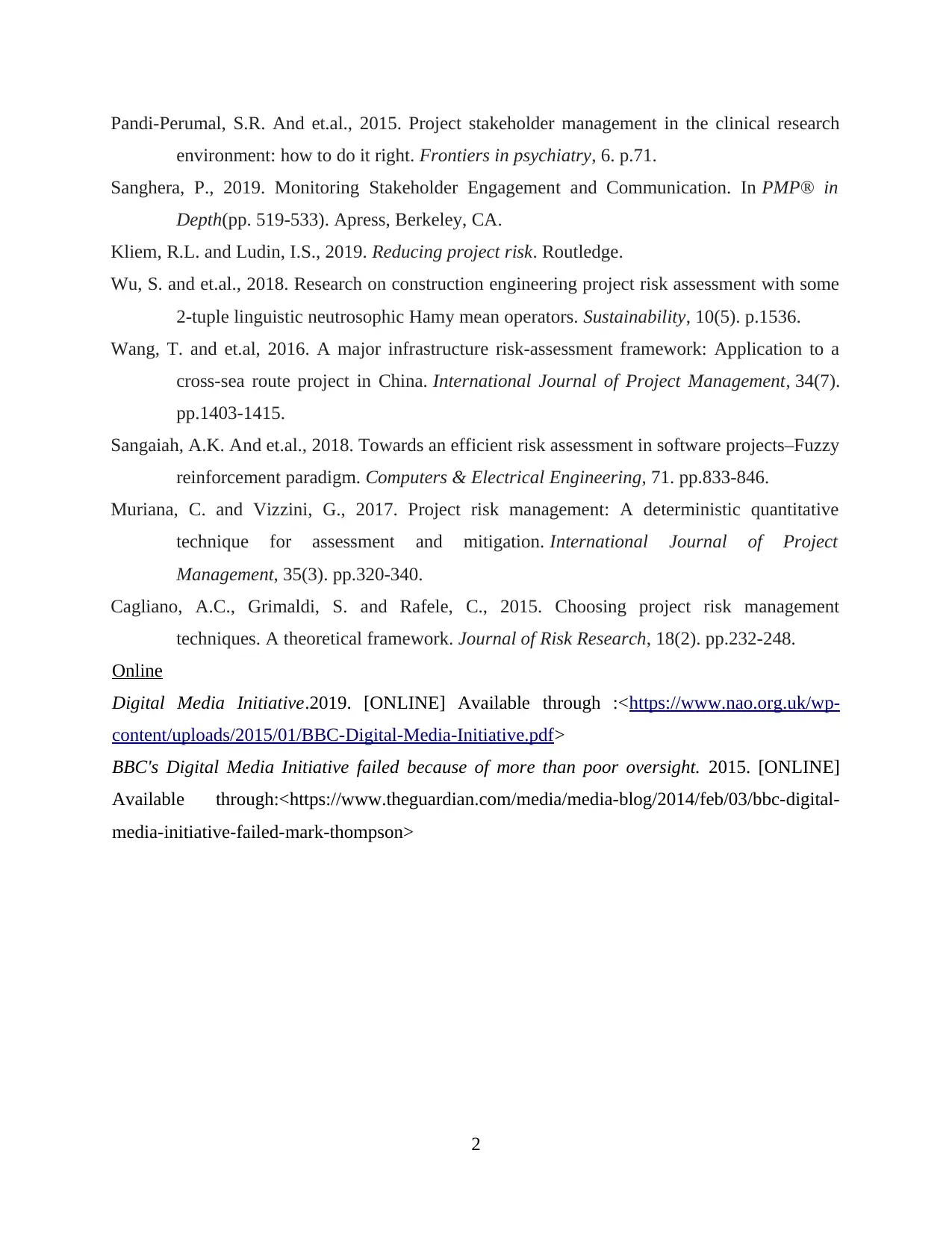
Pandi-Perumal, S.R. And et.al., 2015. Project stakeholder management in the clinical research
environment: how to do it right. Frontiers in psychiatry, 6. p.71.
Sanghera, P., 2019. Monitoring Stakeholder Engagement and Communication. In PMP® in
Depth(pp. 519-533). Apress, Berkeley, CA.
Kliem, R.L. and Ludin, I.S., 2019. Reducing project risk. Routledge.
Wu, S. and et.al., 2018. Research on construction engineering project risk assessment with some
2-tuple linguistic neutrosophic Hamy mean operators. Sustainability, 10(5). p.1536.
Wang, T. and et.al, 2016. A major infrastructure risk-assessment framework: Application to a
cross-sea route project in China. International Journal of Project Management, 34(7).
pp.1403-1415.
Sangaiah, A.K. And et.al., 2018. Towards an efficient risk assessment in software projects–Fuzzy
reinforcement paradigm. Computers & Electrical Engineering, 71. pp.833-846.
Muriana, C. and Vizzini, G., 2017. Project risk management: A deterministic quantitative
technique for assessment and mitigation. International Journal of Project
Management, 35(3). pp.320-340.
Cagliano, A.C., Grimaldi, S. and Rafele, C., 2015. Choosing project risk management
techniques. A theoretical framework. Journal of Risk Research, 18(2). pp.232-248.
Online
Digital Media Initiative.2019. [ONLINE] Available through :<https://www.nao.org.uk/wp-
content/uploads/2015/01/BBC-Digital-Media-Initiative.pdf>
BBC's Digital Media Initiative failed because of more than poor oversight. 2015. [ONLINE]
Available through:<https://www.theguardian.com/media/media-blog/2014/feb/03/bbc-digital-
media-initiative-failed-mark-thompson>
2
environment: how to do it right. Frontiers in psychiatry, 6. p.71.
Sanghera, P., 2019. Monitoring Stakeholder Engagement and Communication. In PMP® in
Depth(pp. 519-533). Apress, Berkeley, CA.
Kliem, R.L. and Ludin, I.S., 2019. Reducing project risk. Routledge.
Wu, S. and et.al., 2018. Research on construction engineering project risk assessment with some
2-tuple linguistic neutrosophic Hamy mean operators. Sustainability, 10(5). p.1536.
Wang, T. and et.al, 2016. A major infrastructure risk-assessment framework: Application to a
cross-sea route project in China. International Journal of Project Management, 34(7).
pp.1403-1415.
Sangaiah, A.K. And et.al., 2018. Towards an efficient risk assessment in software projects–Fuzzy
reinforcement paradigm. Computers & Electrical Engineering, 71. pp.833-846.
Muriana, C. and Vizzini, G., 2017. Project risk management: A deterministic quantitative
technique for assessment and mitigation. International Journal of Project
Management, 35(3). pp.320-340.
Cagliano, A.C., Grimaldi, S. and Rafele, C., 2015. Choosing project risk management
techniques. A theoretical framework. Journal of Risk Research, 18(2). pp.232-248.
Online
Digital Media Initiative.2019. [ONLINE] Available through :<https://www.nao.org.uk/wp-
content/uploads/2015/01/BBC-Digital-Media-Initiative.pdf>
BBC's Digital Media Initiative failed because of more than poor oversight. 2015. [ONLINE]
Available through:<https://www.theguardian.com/media/media-blog/2014/feb/03/bbc-digital-
media-initiative-failed-mark-thompson>
2
Paraphrase This Document
Need a fresh take? Get an instant paraphrase of this document with our AI Paraphraser

3
1 out of 11
Related Documents
Your All-in-One AI-Powered Toolkit for Academic Success.
+13062052269
info@desklib.com
Available 24*7 on WhatsApp / Email
![[object Object]](/_next/static/media/star-bottom.7253800d.svg)
Unlock your academic potential
Copyright © 2020–2026 A2Z Services. All Rights Reserved. Developed and managed by ZUCOL.





